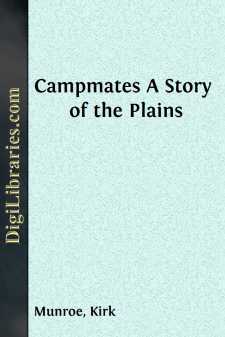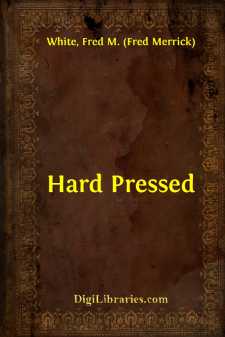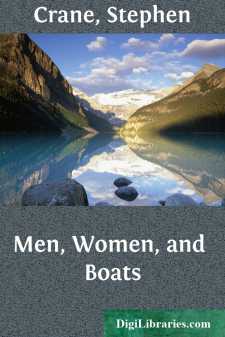Fiction
- Action & Adventure 182
- Biographical 15
- Christian 59
- Classics
- Coming of Age 4
- Contemporary Women 1
- Erotica 8
- Espionage/Intrigue 12
- Fairy Tales, Folklore & Mythology 235
- Family Life 169
- Fantasy 117
- Gay 1
- General 596
- Ghost 32
- Historical 808
- Horror 42
- Humorous 159
- Jewish 25
- Legal 4
- Medical 22
- Mystery & Detective 314
- Political 49
- Psychological 41
- Religious 64
- Romance 157
- Sagas 11
- Science Fiction 730
- Sea Stories 113
- Short Stories (single author) 537
- Sports 10
- Suspense 1
- Technological 8
- Thrillers 2
- Urban Life 29
- Visionary & Metaphysical 1
- War & Military 173
- Westerns 199
Classics Books
Sort by:
by:
Julian Sharman
It lay in the heart of Bohemia. It was approached through a labyrinth of streets that grew denser and darker as one neared the precincts of the club. Could any of the brother Scufflers have seen the neighbourhood by day, it would have presented an appearance dismal and sordid enough. Dealers in faded wardrobes,—merchants in tinsel and rouge de théâtre,—retailers of wigs and fleshings and all...
more...
by:
Kirk Munroe
A WEARY RIDE. Slowly and heavily the train rumbled on through the night. It was called an express; but the year was long ago, in the early days of railroading, and what was then an express would now be considered a very slow and poky sort of a train. On this particular night too, it ran more slowly than usual, because of the condition of the track. The season was such a wet one, that even the oldest...
more...
by:
Walter De Maris
DOWN AND OUT "I wonder who will tell her," I heard somebody say, just outside the arbour. The somebody was a woman; and the somebody else who answered was a man. "Glad it won't be me!" he replied, ungrammatically. I didn't know who these somebodies were, and I didn't much care. For the first instant the one thing I did care about was, that they should remain outside my...
more...
by:
Ralph Bonehill
CHAPTER I FOUR LIVELY BOYS "Boys, I'm going swimming. Who is going along?" "Count me in, Snap," answered Shep Reed. "Swimming?" came from a third youth of the crowd of four. "Why, you couldn't keep me away if you tried. I've been waiting for a swim for about eleven years——-" "And a day," broke in a small, stout youth. "Don't forget the...
more...
They burned a witch in Bingham SquareLast Friday afternoon.The faggot-smoke was blacker thanThe shadows on the moon;The licking flames were strangely greenLike fox-fire on the fen ...And she who cursed the godly folkWill never curse again.They burned a witch in Bingham SquareBefore the village gate.A huswife raised a skinny handTo damn her, tense with hate.A huckster threw a jagged stone—Her pallid...
more...
OCTOBER. FIRST DAY OF SCHOOL. Monday, 17th. To-day is the first day of school. These three months of vacation in the country have passed like a dream. This morning my mother conducted me to the Baretti schoolhouse to have me enter for the third elementary course: I was thinking of the country and went unwillingly. All the streets were swarming with boys: the two book-shops were thronged with fathers...
more...
CHAPTER I IT was a gala night at the National Opera House, and the theatre was crammed from floor to roof, for Melba was sustaining a new part, and all London had gathered to listen. It was rarely indeed that so fashionable an audience assembled in February. The boxes were ablaze with diamonds. On the grand tier, however, there was one box which was not filled with gaily garbed women and which...
more...
WITHOUT DOGMA. ROME, 9 January. Some months ago I met my old friend and school-fellow, Jozef Sniatynski, who for the last few years has occupied a prominent place among our literary men. In a discussion about literature Sniatynski spoke about diaries. He said that a man who leaves memoirs, whether well or badly written, provided they be sincere, renders a service to future psychologists and writers,...
more...
CHAPTER I THE CLUTCHING HAND "Jameson, here's a story I wish you'd follow up," remarked the managing editor of the Star to me one evening after I had turned in an assignment of the late afternoon. He handed me a clipping from the evening edition of the Star and I quickly ran my eye over the headline: "THE CLUTCHING HAND" WINS AGAIN NEW YORK'S MYSTERIOUS MASTER CRIMINAL...
more...
by:
Stephen Crane
STEPHEN CRANE: AN ESTIMATE It hardly profits us to conjecture what Stephen Crane might have written about the World War had he lived. Certainly, he would have been in it, in one capacity or another. No man had a greater talent for war and personal adventure, nor a finer art in describing it. Few writers of recent times could so well describe the poetry of motion as manifested in the surge and flow of...
more...











